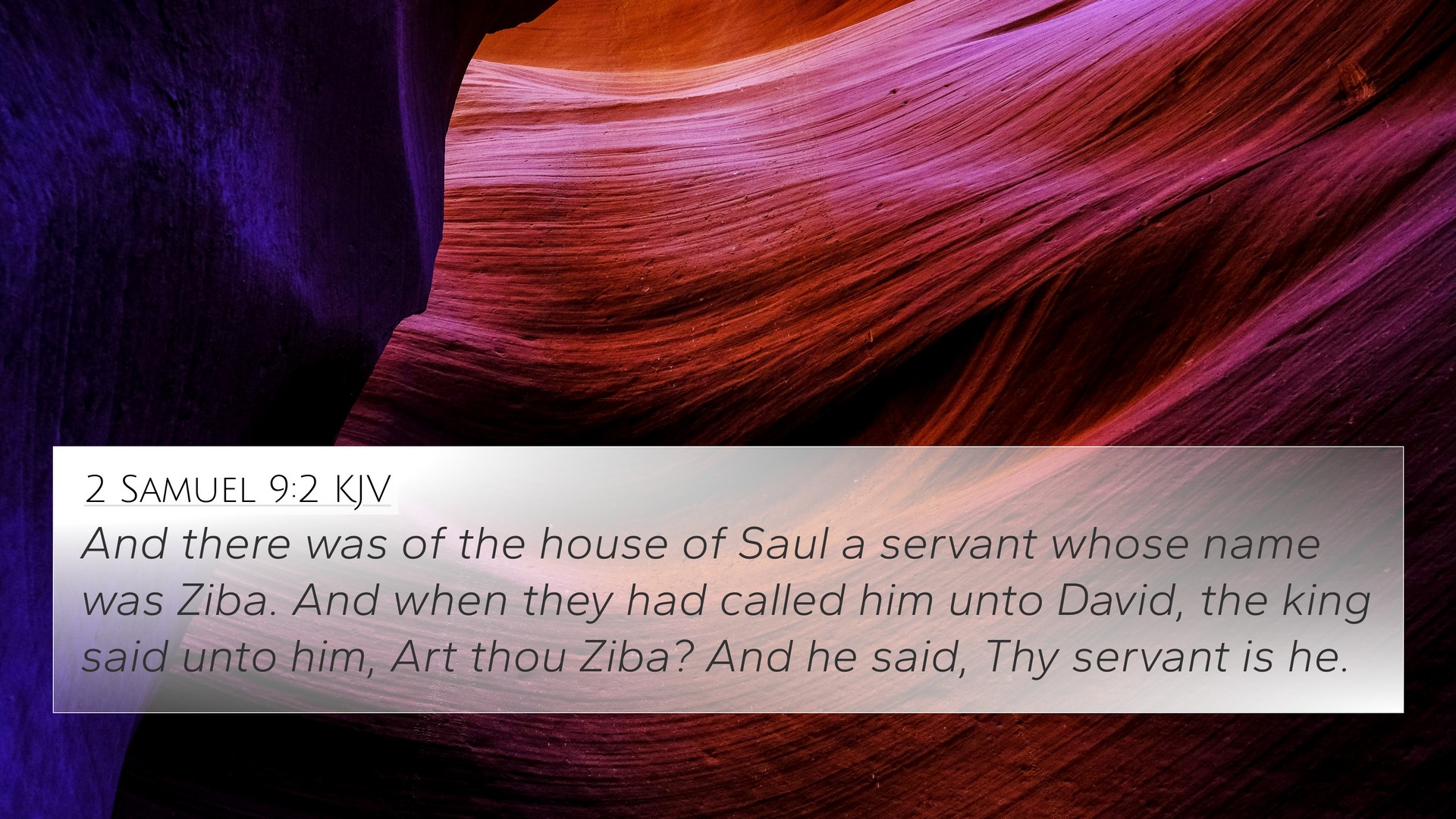Old Testament
Genesis Exodus Leviticus Numbers Deuteronomy Joshua Judges Ruth 1 Samuel 2 Samuel 1 Kings 2 Kings 1 Chronicles 2 Chronicles Ezra Nehemiah Esther Job Psalms Proverbs Ecclesiastes Song of Solomon Isaiah Jeremiah Lamentations Ezekiel Daniel Hosea Joel Amos Obadiah Jonah Micah Nahum Habakkuk Zephaniah Haggai Zechariah Malachi2 Samuel 9:2 Similar Verses
2 Samuel 9:2 Cross References
And there was of the house of Saul a servant whose name was Ziba. And when they had called him unto David, the king said unto him, Art thou Ziba? And he said, Thy servant is he.
Uncover the Rich Themes and Topics of This Bible Verse
Listed below are the Bible themes associated with 2 Samuel 9:2. We invite you to explore each theme to gain deeper insights into the Scriptures.
2 Samuel 9:2 Cross Reference Verses
This section features a detailed cross-reference designed to enrich your understanding of the Scriptures. Below, you will find carefully selected verses that echo the themes and teachings related to 2 Samuel 9:2 KJV. Click on any image to explore detailed analyses of related Bible verses and uncover deeper theological insights.
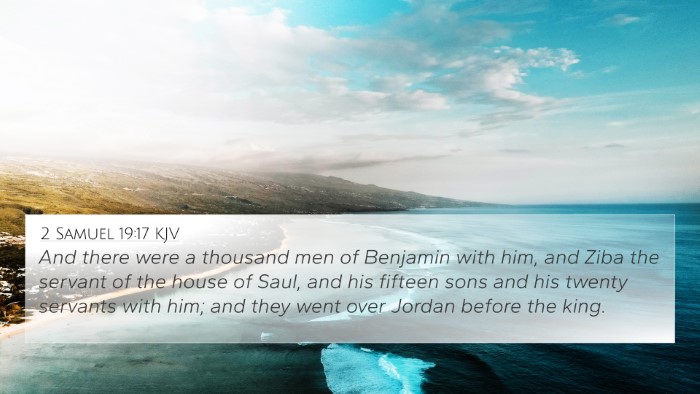
2 Samuel 19:17 (KJV) »
And there were a thousand men of Benjamin with him, and Ziba the servant of the house of Saul, and his fifteen sons and his twenty servants with him; and they went over Jordan before the king.
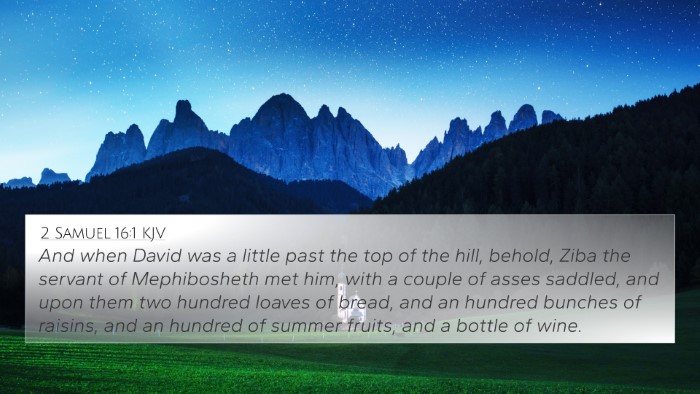
2 Samuel 16:1 (KJV) »
And when David was a little past the top of the hill, behold, Ziba the servant of Mephibosheth met him, with a couple of asses saddled, and upon them two hundred loaves of bread, and an hundred bunches of raisins, and an hundred of summer fruits, and a bottle of wine.
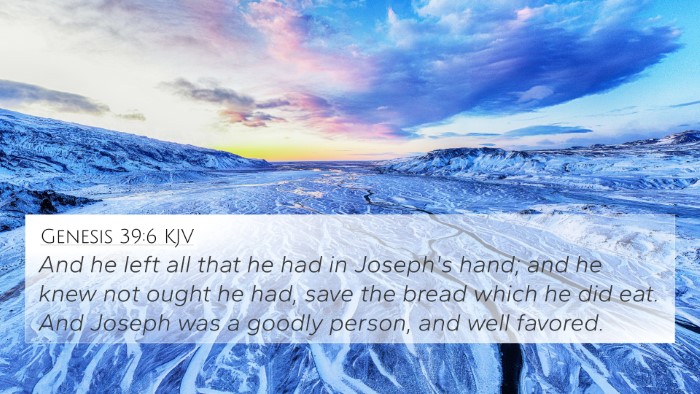
Genesis 39:6 (KJV) »
And he left all that he had in Joseph's hand; and he knew not ought he had, save the bread which he did eat. And Joseph was a goodly person, and well favored.

Genesis 24:2 (KJV) »
And Abraham said unto his eldest servant of his house, that ruled over all that he had, Put, I pray thee, thy hand under my thigh:
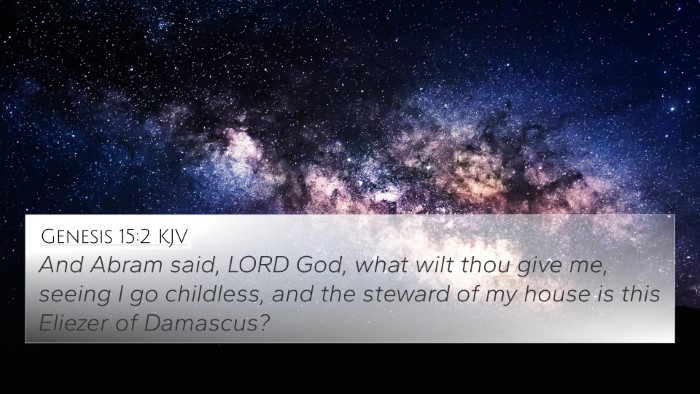
Genesis 15:2 (KJV) »
And Abram said, LORD God, what wilt thou give me, seeing I go childless, and the steward of my house is this Eliezer of Damascus?

2 Samuel 19:27 (KJV) »
And he hath slandered thy servant unto my lord the king; but my lord the king is as an angel of God: do therefore what is good in thine eyes.
2 Samuel 9:2 Verse Analysis and Similar Verses
Understanding 2 Samuel 9:2
2 Samuel 9:2 is a verse that opens a significant chapter in the narrative of King David's reign, showcasing his kindness and loyalty to the family of Jonathan, Saul's son. In this passage, David seeks out survivors from the house of Saul to show them kindness for the sake of Jonathan. This act reflects David's character and serves as a profound illustration of God's grace and mercy.
Commentary Insights
In the examination of this verse, several public domain commentaries provide valuable insights regarding its meaning and implications:
- Matthew Henry emphasizes the theme of divine grace found within this act. He points out that David's initiative to seek out Saul's descendants demonstrates his commitment to honor his covenant with Jonathan. Henry notes that this act signifies not only David’s loyalty but also God's providence in connecting the covenant relationship beyond death.
- Albert Barnes focuses on the specifics of David's inquiry, noting the importance of his desire to show kindness. Barnes highlights that this kindness is a testament to David’s character and serves as an important model for believers today, encouraging acts of kindness and loyalty despite past animosities.
- Adam Clarke provides additional context, suggesting that David’s actions can be seen as a reversal of the prevailing animosity towards Saul’s lineage. In this way, Clarke notes, it serves as a precursor to the New Testament teachings on grace, illustrating how grace often reaches those who are least deserving.
Biblical Context and Cross References
To fully grasp the meaning of 2 Samuel 9:2, it is helpful to consider its context and related scripture. Below are notable cross-references and thematic connections:
- 1 Samuel 20:14-17: Where Jonathan and David make a covenant of friendship, highlighting the underlying loyalty that dictates David's actions in 2 Samuel 9:2.
- 2 Samuel 4:4: Discusses Mephibosheth, Jonathan's son, who is left as a representative of Saul's lineage.
- Matthew 5:7: Introduces the principle of mercy, which parallels David's intent to show kindness to Mephibosheth.
- Luke 14:13-14: Jesus speaks about inviting the poor and the crippled as an act of kindness, much like David's actions.
- Romans 15:8: Highlights Christ’s faithfulness to the Jewish lineage, akin to David's faithfulness to Jonathan's family.
- Ephesians 2:4-5: Explains God’s mercy towards sinners, reminiscent of David’s unmerited kindness towards Mephibosheth.
- 2 Samuel 9:10: Continues to illustrate the depth of David’s kindness as he provides for Mephibosheth.
Thematic Connections
This verse further creates thematic links between love, loyalty, and grace throughout the Bible:
- God’s Covenant Love: David's actions reflect the covenant love of God towards His people, resonating throughout scripture from the Old Testament to the New Testament.
- The Value of Kindness: This act serves as a reminder for Christians to extend kindness as an embodiment of their faith.
- Restoration: David’s initiation of kindness also signifies the theme of restoration, which runs throughout biblical narratives.
Practical Application
For contemporary readers, 2 Samuel 9:2 serves as a compelling reminder of the importance of keeping our promises and showing kindness to others, particularly those who may be marginalized or forgotten. It encourages believers to:
- Honor commitments to friends and family, even after they are gone.
- Seek to extend grace and kindness regardless of past grievances.
- Reflect the character of God through acts of mercy and compassion towards others.
Conclusion
In summary, 2 Samuel 9:2 stands as a pivotal verse rich with meaning, highlighting the themes of loyalty, kindness, and covenant love. Through the insights gained from commentaries and related scriptures, readers can appreciate the depth of David's action and its implications for their own lives.
By exploring the connections between this verse and others, we engage in a broader narrative of grace that culminates in New Testament teachings, continuing the dialogue across scripture.
